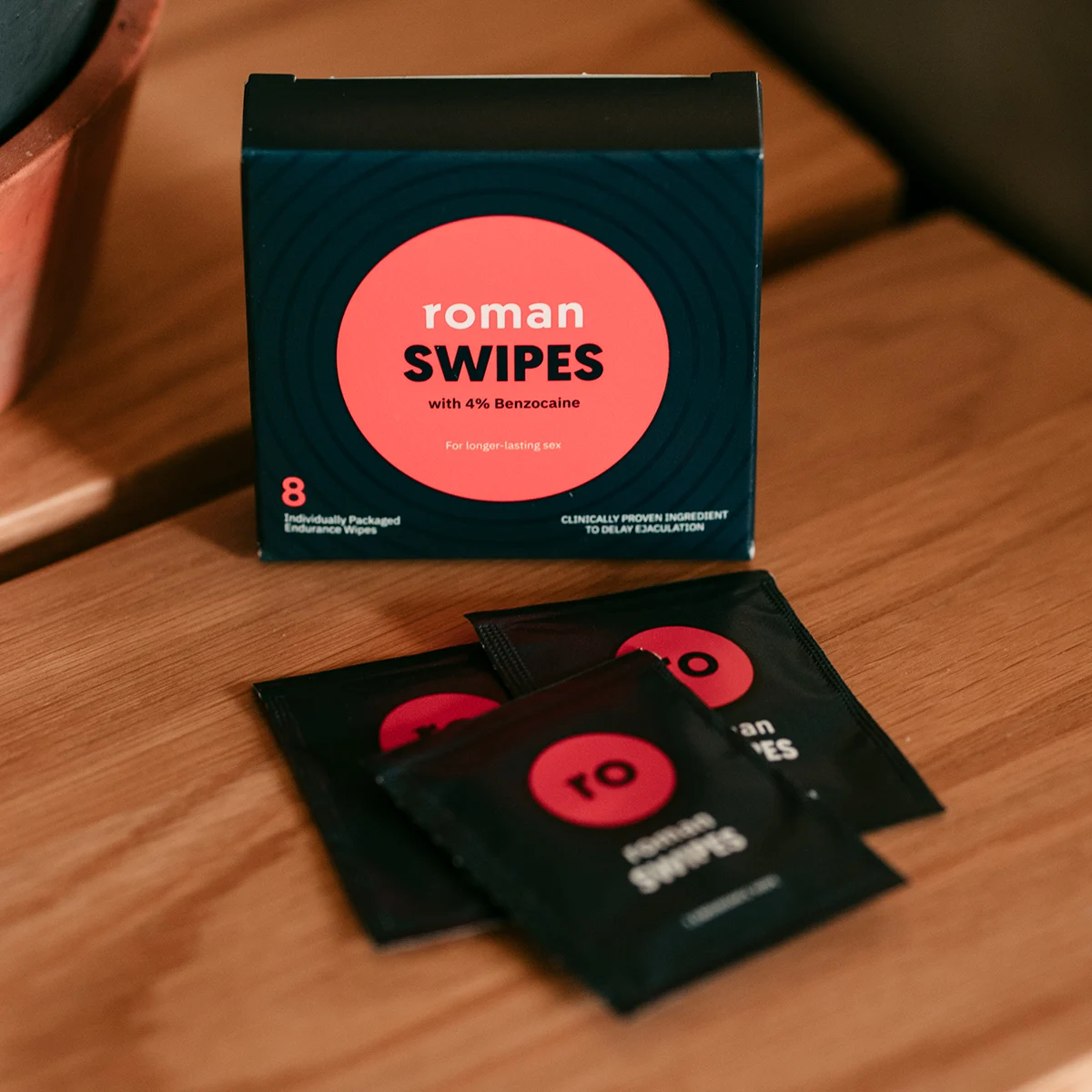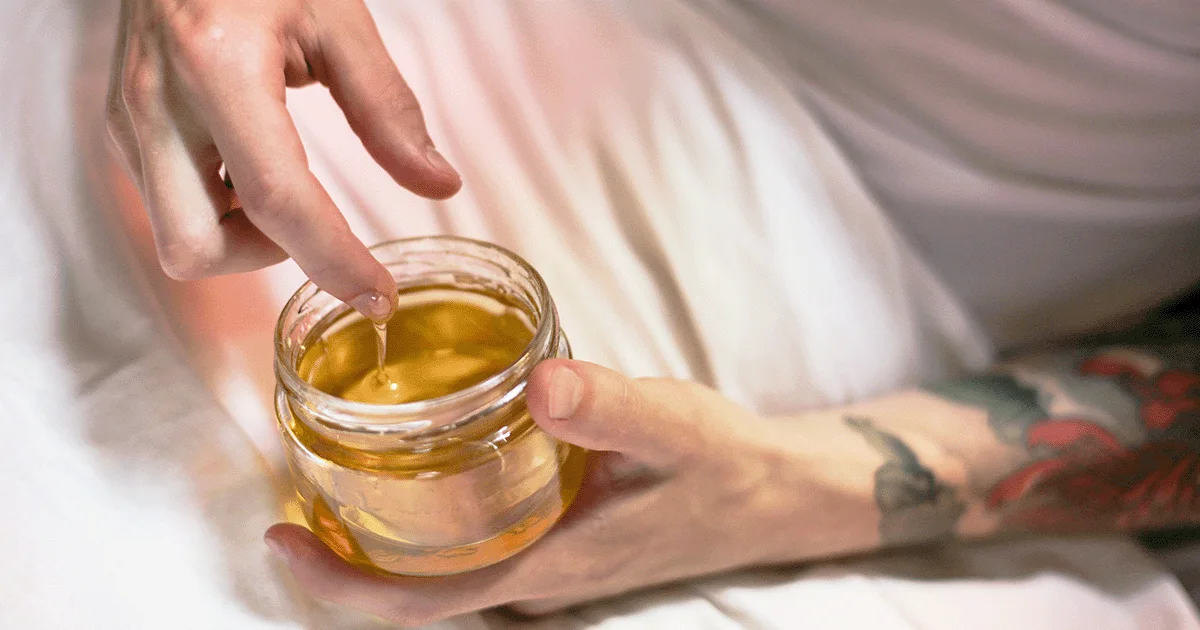Here's what we'll cover
Here's what we'll cover
Premature ejaculation affects at least one third of men in the U.S. This condition can be frustrating—but fortunately, it is also treatable. One option is using benzocaine wipes to help you achieve more satisfying sex. Read on to learn more about how benzocaine wipes work.
What is premature ejaculation?
Premature ejaculation (PE) is one of the most common types of male sexual dysfunction and affects at least one third of sexually active men. PE is when ejaculation happens before you or your partner would like. Occasional PE is usually not a problem, but if it is happening regularly or causing you significant distress, then it’s time to speak to your healthcare provider about your symptoms (Crowdis, 2021).
You may have premature ejaculation if (Crowdis, 2021):
You always or almost always ejaculate within one minute of penetration (for lifelong PE) or within three minutes of penetration (for PE that comes on after having normal ejaculations).
You cannot control or delay ejaculation during sexual activities all or nearly all of the time.
You are experiencing distress, frustration, and/or avoidance of sexual intercourse because of your ejaculatory issues.
What are benzocaine wipes?
Benzocaine is a topical anesthetic, a drug that makes the treated area numb. It works for PE by decreasing the sensitivity of the penis, which increases ejaculation control. Benzocaine wipes are available over-the-counter; they are specially formulated to reduce penis sensitivity without causing numbness. They are usually discreetly wrapped moist towelettes that you apply to your penis before sexual intercourse.
Do benzocaine wipes work?
In a small study published in The Journal of Urology, 21 men with PE received either 4% benzocaine wipes or placebo wipes to use before sex. After two months, the men who used the benzocaine wipes reported significant improvement in the duration of their ejaculations after vaginal penetration compared to those using placebo wipes. Also, compared to the untreated placebo group, men in the benzocaine group reported that they felt a decrease in sexual frustration and a more significant improvement in sexual satisfaction and control of their ejaculations (Shabsigh, 2017).
The researchers measured the time it takes from vaginal penetration to ejaculation, also known as the intravaginal ejaculatory latency time (IELT). After using the benzocaine wipes, the IELT increased to an average of 165 seconds after one month and 330 seconds after two months (Shabsigh, 2017).
In fact, 76% of men in the treatment group had an IELT of at least two minutes at one month, and this increased to 88% at two months. Only 33% of the untreated placebo group reached the 2-minute mark (Shabsigh, 2017).
Another study looking at different topical agents, including benzocaine wipes, found that these treatments seem effective. However, more clinical trial data is needed to determine their effectiveness (Butcher, 2020).
How long do premature ejaculation wipes last?
Most benzocaine products take 5–10 minutes to desensitize your penis, and the effects typically last up to 60–90 minutes (Porst, 2019).
Risks and side effects of benzocaine wipes
Overall, men in the benzocaine wipe study tolerated the treatment well, and there were no reports of their partners also having numbness or decreased sensation (also called transference) (Shabsigh, 2017).
Potential side effects of benzocaine wipes include (Butcher, 2020):
Skin rash
Irritation
Burning
Itching
Excessive numbing
In other topical anesthetic products, like creams or sprays, there are reports of the numbing medication getting transferred to partners or numbness of the penis leading to erectile dysfunction (Raveendran, 2021). However, none of these have been reported with benzocaine wipes as yet.
You should avoid benzocaine products if you have an allergy to benzocaine.
DISCLAIMER
If you have any medical questions or concerns, please talk to your healthcare provider. The articles on Health Guide are underpinned by peer-reviewed research and information drawn from medical societies and governmental agencies. However, they are not a substitute for professional medical advice, diagnosis, or treatment.
Butcher, M. J., Zubert, T., Christiansen, K., Carranza, A., Pawlicki, P., & Seibel, S. (2020). Topical agents for premature ejaculation: a review. Sexual Medicine Reviews, 8( 1), 92–99. doi: 10.1016/j.sxmr.2019.03.003. Retrieved from https://pubmed.ncbi.nlm.nih.gov/30987933/
Crowdis, M. & Nazir, S. (2021). Premature ejaculation. [Updated Jul 1, 2021]. In: StatPearls [Internet]. Retrieved from https://www.ncbi.nlm.nih.gov/books/NBK546701/
DailyMed. (2014). Preboost: Benzocaine liquid/male genital desensitizer towelette liquid. Retrieved on Sep 2, 2021 from https://dailymed.nlm.nih.gov/dailymed/fda/fdaDrugXsl.cfm?setid=5da84dea-e28e-474a-a33a-e72db27bffad&type=display
Raveendran, A. V. & Agarwal, A. (2021). Premature ejaculation - current concepts in the management: a narrative review. International Journal of Reproductive Biomedicine, 19 (1), 5–22. doi: 10.18502/ijrm.v19i1.8176. Retrieved from https://www.ncbi.nlm.nih.gov/pmc/articles/PMC7851481/
Serefoglu, E. C., Mcmahon, C. G., Waldinger, M. D., Althof, S. E., Shindel, A., Adaikan, G., et al. (2014). An evidence-based unified definition of lifelong and acquired premature ejaculation: report of the Second International Society for Sexual Medicine Ad Hoc Committee for the definition of premature ejaculation. Sexual Medicine, 2 (2), 41–59. doi: 10.1002/sm2.27. Retrieved from https://pubmed.ncbi.nlm.nih.gov/25356301/
Shabsigh, R., Shabsigh, R., Kaminetsky, J., Kaminetsky, J., Yang, M., Yang, M., et al. (2017). Pd69-02 Double-blind, Randomized Controlled Trial Of Topical 4% Benzocaine Wipes For Management Of Premature Ejaculation: Interim Analysis. The Journal of Urology, 197 (4S), e1344-e1345. Retrieved from https://www.auajournals.org/doi/10.1016/j.juro.2017.02.3143










